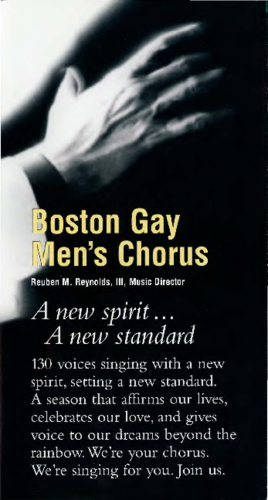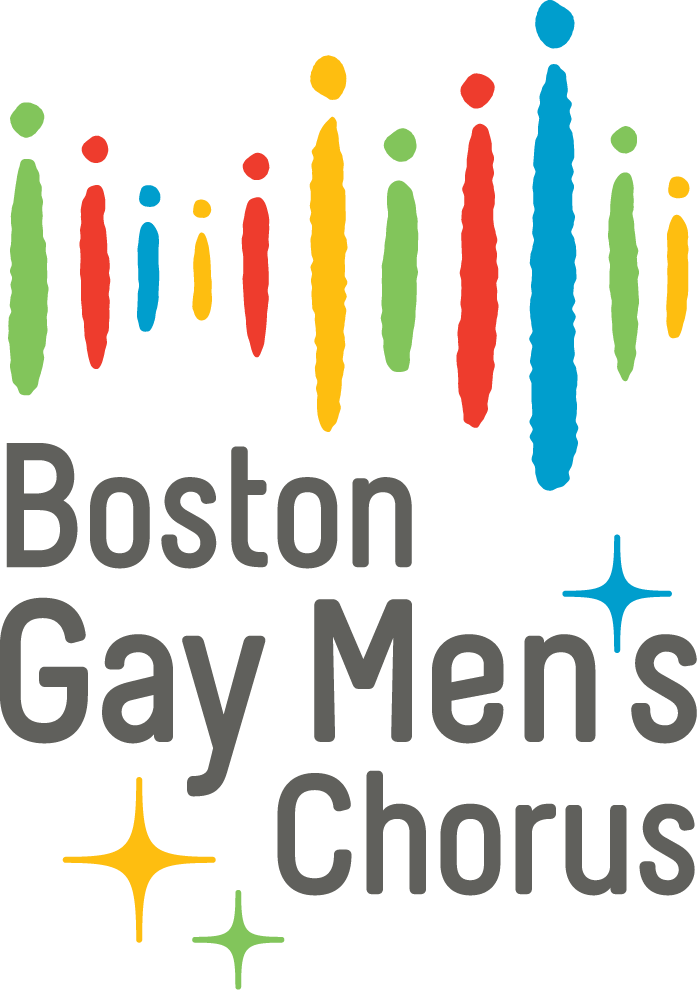Starting with the death of Joe Molloy and continuing through the early 90s, AIDS had a dramatic impact on the chorus. By 1994, AIDS was the leading cause of death for all Americans between the ages of 25 and 44. A BGMC HIV+ Support Group was created to help members who were living with HIV/AIDS. There were times when each week would bring a new death of a member. In the eight years between Joe’s death in 1987 and 1995, the chorus lost forty members. It seemed that the chorus was constantly singing at memorial service for the victims. Throughout this time, an HIV/AIDS diagnoses was the equivalent of a death sentence. Some treatments had been introduced that prolonged life somewhat, but came with toxic side effects. In June 1995 the U.S. Food and Drug Administration approved the first protease inhibitor drug for public use, Saquinavir. Within two years, AIDS deaths dropped by 50%. After 1995, the chorus lost only a couple more members to the disease, most recently in 2008.
That year also saw another landmark change for the chorus. In January, BGMC member Steve Smith became the first executive director of the chorus, replacing administrative director Ann Vivian who had departed a few months earlier. Hiring a full-time executive director marked a major milestone for the organization. For the first time we had someone in charge of all aspects of the administration and business side of the organization.
Steve joined the chorus in September 1989, thus was intimately acquainted with the organization and its needs. He is a graduate of the Baldwin-Wallace College conservatory’s Arts Management Program, with a dozen years of experience in the field. As Steve told the audience in the program at his first concert as executive director:
I have always worked in the arts administration field because I am hopelessly, indiscriminately, in love with the beauty of song, the power of the orchestra, the energy of dance. But it has been as a member of the BGMC that I have discovered my passion for making the arts important in people’s day to day lives—the lives of our members, our audience, our community. . . As I make the transition from member to employee, I can’t imagine a better place to share these passions. I’ve found my home.

September of that year brought yet another tremendous honor to the chorus, and recognition of the place it holds in the Boston arts community. The city’s longstanding sports venue, the Boston Garden, had been torn down and was being replaced with the new FleetCenter (today TD Boston Garden). The chorus was selected to not only perform at the opening ceremonies of the new venue, but given the incredible honor of singing the Star Spangled Banner, accompanied by Keith Lockhart and the Boston Pops Esplanade Orchestra. In addition to the performance, Chad had the honor of writing the choral arrangement for the chorus to perform. The BGMC would also sing in the finale, with the Boston Community Gospel Choir and the Tanglewood Festival Chorus as the Pops provided the music.
Mayor Thomas Menino’s Liaison to the Gay and Lesbian Community John Affuso wrote that “The Chorus is an important source of gay visibility in the City of Boston, and your presence at the Fleet Center can only continue to remind all Bostonians of the rich diversity of this city.” Lawrence C. Moulter, president and chairman of the FleetCenter wrote to Steve Smith after the event: “thanks for making the FleetCenter opening so special. It was not only important to me, but to all of us in the community that the FleetCenter be perceived as open and responsive to everyone’s needs in this community. I am delighted that you and the Chorus were able to help us accomplish that end.”
The holiday 1995 concert was recorded live for publishing the chorus’ second CD. The concert included a sing-along section, so the entire audience would appear on the CD as well. The concert, Making Spirits Bright, was released on CD in 1996 as Freedom, Merriment, and Joy.
The spring of 1996 saw the chorus take another New England tour. We travelled to Springfield, Massachusetts, to perform on April 27 at the First Unitarian Universalist Church. The next day we performed in Albany, New York. The following weekend we performed on Cape Cod in West Barnstable, Massachusetts. The holiday show that year saw the chorus share the stage with the Treble Chorus of New England, becoming the first gay chorus to sing with a children’s chorus. For the spring show in March 1997, Voices of Freedom, the BGMC was joined by some of the 500 members of the nine GALA choruses in New England. During the concert the chorus also honored U.S. Representative Barney Frank for his work on behalf our community.
The Pride concert that year, Out on the Town, was the fifteenth anniversary of the chorus. It featured a special guest artist: singer Ann Hampton Callaway. Among the songs she sang during the show was her most well-known number, the theme song from the television show The Nanny. The chorus also sang a number of pieces designed to provide the experience of a club-hopping night out on the town. This was also the final Boston concert for music director Robert Barney. Robert wrote in his final program:
As this is my last letter in a Boston Gay Men’s Chorus Concert Program as Music Director, I am filled with mixed emotions as well as a desire to write about tonight’s program. Although I am anxious to embark on new ventures I will greatly miss my work with the Chorus and especially with you, our audience. . .
I have been continually amazed as John O’Neill or I give Chad a suggestion almost half kidding and he takes off with the idea and creates a wonderful arrangement in seemingly no time at all. . .’
Later this Summer, at the conclusion of the search process for my successor, the Chorus will announce the appointment of a new Music Director. I wish him or her and the chorus all the best for a long and happy relationship. I am extremely proud to have served the community and contributed what I could to the cause over these last twelve years. I am sad to be leaving the Chorus but the time has come to pass the baton and I am off to new and exciting opportunities for my own personal career.
Robert brought the chorus through a critical phase in its development. He took the foundation that Lee had built, and created an organization that was recognized not just locally, but on a national level as well. He put his talents to use to create a musical organization that would also fight for our rights and change the world. We asked Robert recently about his time with as our music director. We asked him how he would like to be remembered:
I hope that I’m remembered by the chorus as foundational. When I took over the chorus, the budget was $4,500 and when I left it was a half million. I was there for many of the chorus firsts. I’m hoping that I’m remembered for carrying us through a very difficult time in the gay community. . . And so I hope that when people look back that Robert Barney helped established visions for the future.
He went on to say that at the end:
I wanted to do it for one more concert because there was a part of me that I didn’t want to let go of it. Even though I knew that the time had come for me to move on personally and professionally to move on, and it was the chorus’ time to move on personally and professionally. I loved the chorus. . . . I never stopped loving the chorus. I loved everyone in the chorus, even when they caused me grief because I knew they did it because they care.
